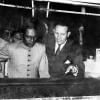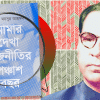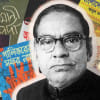"Abul Mansur Ahmad had been constantly fighting for change in the society”

Speakers, who took part in an event about renowned literary journalist and politician Abul Mansur Ahmad, said that he took journalism as a pursuit. At the core of all his activities was the welfare of the working people, society, and the state.
Describing Abul Mansur Ahmad as a multi-faceted personality, the speakers said that from a sense of responsibility to the society, he has constantly fought for the rights of citizens, freedom of speech and change in the society. At the same time, the extraordinary combination of literature and journalism that he has done is still exemplary.
Abul Mansur Ahmad Smriti Parishad organised the event titled 'Relevance of Journalism and Essay Competition of Abul Mansur Ahmad in the Centenary' at Muzaffar Ahmed Chowdhury Auditorium of Dhaka University on the afternoon of September 16, Saturday.
This year marks the 100th anniversary of Abul Mansur Ahmad's journalism. He started his journalism career in 1923 by joining the Kolkata-based weekly Choltan. Over time, he established himself as a pioneer of intellectual journalism.
Emeritus Professor Sirajul Islam Chowdhury presided over the function. He said, "Abul Mansur Ahmad had many identities. He was a journalist, a writer, a politician, a lawyer by profession. Today we say that Abul Mansur Ahmad was an intellectual."

"In general, we understand how important journalism is within the state, within the state system, in society. That's why we talk about freedom of expression, we talk against the Digital Security Act, we talk against harassment", he further said, adding that, "That is because politics does not ignore journalism, the state does not ignore journalism and when Abul Mansur Ahmad started journalism 100 years ago, the society was more backward. We were under colonial rule, our future uncertain. There, he considered the problems of farmers to be the main ones. His approach to politics was very clear."
At the same time, Sirajul Islam Chowdhury said that the extraordinary combination of literature and journalism that Abul Mansur Ahmad had carried out was exemplary.
Nurul Kabir, editor of English daily New Age, said, "Abul Mansur Ahmad has explained that popular opinion is not always the right opinion. On the one hand, he had the intellectual capacity and political commitment to think differently about the public outcry and the maze of thought."
"At that time, not a single person from the region discussed the politics of language except Abul Mansur Ahmad", he also said.
Participating in the discussion, R Raji, professor at the department journalism at Chittagong University, talked about the language of Abul Mansur Ahmad. He said, "The lesson of Abul Mansur Ahmad was of the opinion that people's language should reach their pens."
Faruk Wasif, planning editor of the daily Samakal, discussed Abul Mansur Ahmad's revolutionary role in social transformation through Krishak-Praja Party, the beginning of Bangla language and the implementation of cultural politics through journalism, and his position as a visionary of this country.

"The importance of journalism is more important when a nation is being oppressed. The liberation of a country is not possible without journalists. Political leadership alone cannot do this. That is why the Krishak-Praja Party invested in newspapers."
He also said that there was a place for self-exploration in all the activities of Abul Mansur Ahmad.

Journalist and researcher Kajal Rashid Shaheen discussed the relevance of Abul Mansur Ahmad's journalism in the centenary. "Abul Mansur Ahmad was a professional journalist and editor. But his work, dedication, love and pursuit of journalism-editorship had taken the newspaper industry and its path to becoming an industry to a level from which a newspaper owner, a journalist-editor, a professor, and a theoretical researcher have a lot of unique elements to learn."
At the end of the discussion, Professor Sirajul Islam Chowdhury handed over the prizes to the winners of the essay competition. They were given books, certificates and cash prizes.
The winners of the essay competition were Zubair Ibne Kamal, Abul Hasnat, Farid Uddin Rony, G Mostafa, Faiza Binte Haque, Mezbah Uddin Fahim, Rabat Reza Noor, Mahbub Nahid, and Mohaimin Ahmed Ashik.
This article has been translated by DS Books. The report originally appeared in Daily Star Bangla.

 For all latest news, follow The Daily Star's Google News channel.
For all latest news, follow The Daily Star's Google News channel. 










Comments